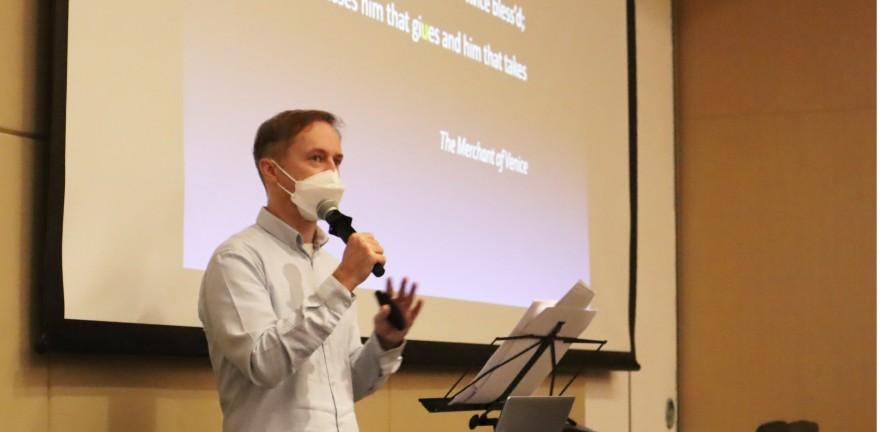
Submitted by Jane Durkin on Mon, 31/10/2022 - 13:44
Daniel Weston is Assistant Professor of English of at Hong Kong University (HKU).
His research interests include bilingual pragmatics (code-switching), World Englishes (specifically English dialect development), and the discourse analysis of gatekeeping encounters.
He is currently collaborating with the University of Cambridge on a project examining the communicative effectiveness of the undergraduate admissions interview. To this end, he is an affiliate and visiting scholar at Cambridge Language Sciences. He is also an advisor and contributor at the Anglia Ruskin Research Centre for Intercultural and Multilingual Studies (ARRCIMS).
Daniel will be presenting ‘'Aloof's Ramp', 'Jardin de Glynn': Gibraltar's street names and an eighteenth-century Western Mediterranean spatial practice’ with Laura Wright at the Cambridge Language Sciences Annual Symposium on 24 November 2022. This will be part of a research dialogue on 'Language, culture and identity: perspectives from historical linguistics and sociolinguistics’ with Esther-Miriam Wagner (The Woolf Institute).
My research sets out to explore dialect emergence and development in Gibraltar and Hong Kong on the one hand, and language use within Cambridge admissions interviews on the other. Although these are quite different areas of research, both are concerned with language use in its sociolinguistic contexts.
I find the social relevance of my admissions interviews project to be quite motivating. These interviews have a huge impact on candidates’ lives, but they’re still quite poorly-understood. There are a lot of anecdotal accounts of the interview, but no-one has been able to study it empirically up till now. Of course, that’s also quite challenging as it requires me to understand a variety of subject interviews, from English Literature to Physics, well enough to know what’s going on – and what’s going wrong – with the interaction.
Getting access to a corpus of Cambridge interview data has helped my research enormously. It wasn’t easy, but I was really grateful that Churchill College was willing to be convinced about the importance of this kind of research.
My current research is about historical language use in Gibraltar, which is a refreshing break from admissions interviews. Gibraltar has traditionally been understood in terms of its relationship to Spain and Britain. Laura Wright and I are interested in demonstrating how it was also a trading node in a network of Mediterranean forts. People moved from one fort to another, servicing the military garrisons in each place. To do that effectively, they needed to be multilingual and multicultural. Streetnames across Mediterrenean forts demonstrate this as they all contain common surnames from these itinerant fort servicers.
I’m particularly excited about exploring the non-English sources for language use across the 18th and 19th century Mediterranean. The English sources have often been quite effectively mined, but doing archival work in Spanish, Catalan, Arabic and/or Maltese would really offer a new perspective on this world. Of course, that will have to wait until I can leave Hong Kong, and we will definitely need to recruit a PhD student who can read Arabic or Maltese.
I hope our research into Gibraltar will stimulate interest in what is sometimes perceived as an unfashionable place to study. While decolonizing the curriculum might lead to new voices being heard, it can also lead to some voices being silenced, and as residents of a British Dependent Territory, Gibraltarians are at risk of falling into that category.
Gibraltar contributes to our understanding of language diversity. Spanish women have contributed enormously to the linguistic and cultural heritage of the Rock, but the British connection means Gibraltarians are wary of acknowledging that fact owing to the antagonistic political relationship between Gibraltar and Spain. The local view of the recent shift towards English is therefore ambivalent as, on the one hand, it represents a loss of bilingualism, which is bad, but on the other hand, the growing dominance of English on the Rock rhymes with its preferred political identity.
Language diversity shouldn’t be seen as some sort of peculiarly modern, forward-thinking or socially progressive linguistic phenomenon. Language diversity has always been a feature of historical language use because people are diverse, and the guiding principle of sociolinguistic research is that our social lives influence how we use language, and vice versa. In that sense, language diversity is a ‘fait accompli’ of human existence. Our role is and always has been to understand, theorize and document the myriad ways that language diversity is realized.
